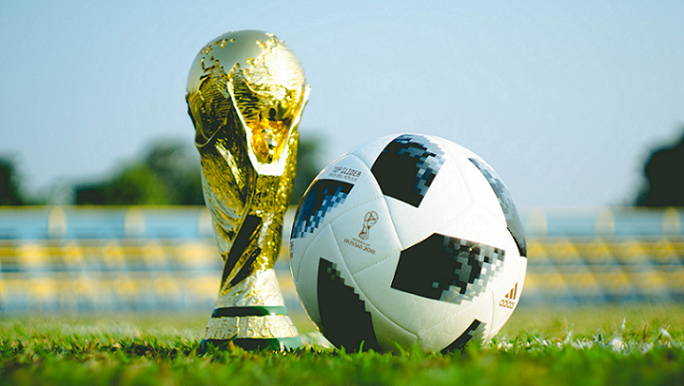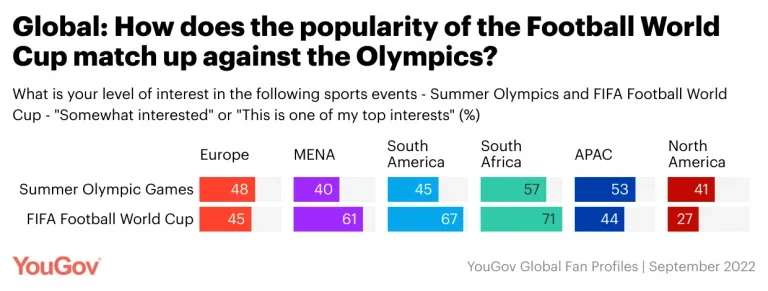
FIFA World Cup: Where is interest strongest around the globe
Four in nine consumers express interest in the World Cup. How does this compare with the Summer Olympics and who are the fans?
YouGov Global Fan Profiles reveals that 45% of consumers across 50 markets in our database are either “somewhat interested” in the FIFA World Cup or say that it is “one of their top interests”. No other single-sport event generates more interest, with only the multi-sport Summer Olympics (50%) surpassing it among all sports events.
FIFA World Cup vs Olympics – A deep dive
The degree of fan following for the World Cup varies dramatically across different markets. Compared to the Summer Olympics, the event is markedly more popular among consumers in MENA (61% vs 40%), South America (67% vs 45%), and South Africa (71% vs 57%). The Olympics takes a substantial lead in North America (41% vs 27%) and inches ahead in both APAC (53% vs 44%) and Europe (48% vs 45%).

But there are sharp variances even within these broader regions. For instance, nearly seven in ten Indonesians (70%) express interest in the FIFA World Cup compared to just 37% who do so in the Summer Olympics, which is a stark deviation from the overarching trend in APAC. In China, the pattern is reversed with the Summer Olympics enjoying a marked advantage (60% vs 35% for the World Cup).
In North America, the Summer Olympics enjoys outsized popularity in Canada (49% Summer Olympics vs 29% World Cup) and the US (36% vs 18%), but things even out in Mexico (57% vs 55%). These three countries will co-host the 2026 World Cup.
Younger audiences show a preference for the FIFA World Cup globally
Consumers aged between 18-24 are five-percentage points more likely to express an interest in the FIFA World Cup (45%) than in the Summer Olympics (40%). And the same is true of those aged between 25-34. Differences even out among those aged 35-44 (45% World Cup, 44% Summer Olympics).
Among consumers aged 45-54, the share of those who express an interest in the Olympics rises further still to 48%, while the World Cup still attracts the interest of slightly over two-fifths (43%). But only a third of those aged over 55 say they are interested in the World Cup (34%), while half of them say they are interested in the Summer Olympics (51%)
Differences are also observed based on gender. The World Cup is the favourite event of men globally (55%), with the Summer Olympics taking a close second place (52%). While women are less likely than men to express an interest in either event, they show a noteworthy preference for the Summer Olympics (47%) than for the World Cup (35%).
To get a sense of why the World Cup is so popular, it is worth considering the widespread popularity of the game itself.
Gamers are markedly more drawn to the World Cup than the overall population
Looking at select markets, gamers are more likely than all consumers to be interested in the World Cup. A quarter of American gamers (25%) say they are interested in the World Cup compared to 18% of the overall population.
In Britain, gamers are nine-percentage points likelier than the national population to say they are interested in the World Cup (49% vs 41%).
Similarly in Germany, the World Cup is more popular among gamers. About half of gamers in the country say they are interested in the World Cup (51%) compared to 45% of the overall population.